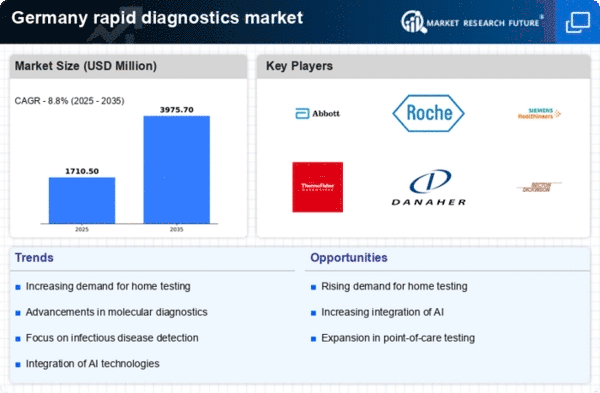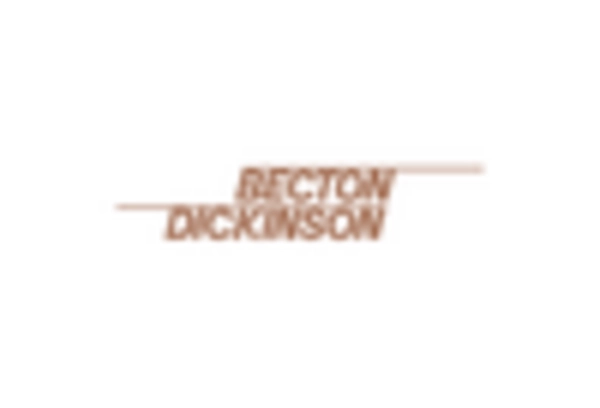Supportive Regulatory Environment
The regulatory landscape in Germany is increasingly supportive of innovations in the rapid diagnostics market. The government has implemented policies aimed at expediting the approval process for new diagnostic technologies, which encourages research and development. Initiatives such as the Medical Device Regulation (MDR) and In Vitro Diagnostic Regulation (IVDR) are designed to ensure that rapid diagnostic tools meet high safety and efficacy standards while facilitating quicker market access. This regulatory support is crucial for fostering innovation and attracting investments in the rapid diagnostics sector. As a result, companies are more inclined to develop and introduce novel diagnostic solutions, which is likely to enhance competition and drive growth within the market.
Growing Prevalence of Chronic Diseases
The rising incidence of chronic diseases in Germany is a pivotal driver for the rapid diagnostics market. As the population ages, conditions such as diabetes, cardiovascular diseases, and respiratory disorders become more prevalent. This trend necessitates timely and accurate diagnostic solutions to manage these health issues effectively. According to recent data, chronic diseases account for approximately 80% of healthcare costs in Germany, highlighting the urgent need for rapid diagnostics. The ability to quickly identify and monitor these conditions can lead to better patient outcomes and reduced healthcare expenditures. Consequently, healthcare providers are increasingly investing in rapid diagnostic tools, which are essential for early detection and management of chronic diseases, thereby propelling the growth of the rapid diagnostics market in the country.
Technological Integration in Healthcare
The integration of advanced technologies into healthcare systems in Germany is significantly influencing the rapid diagnostics market. Innovations such as artificial intelligence, machine learning, and point-of-care testing are enhancing the efficiency and accuracy of diagnostic processes. For instance, AI algorithms can analyze diagnostic data more rapidly than traditional methods, leading to quicker decision-making in clinical settings. The German healthcare sector is increasingly adopting these technologies, with investments in digital health solutions projected to reach €5 billion by 2026. This technological evolution not only streamlines diagnostic workflows but also improves patient engagement and satisfaction. As healthcare providers seek to enhance service delivery, the demand for rapid diagnostics tools that leverage these technologies is likely to grow, further driving the market.
Increased Investment in Healthcare Infrastructure
Germany's commitment to enhancing its healthcare infrastructure is a significant driver for the rapid diagnostics market. The government has allocated substantial funding to improve healthcare facilities and services, with an emphasis on integrating advanced diagnostic technologies. Recent reports indicate that healthcare spending in Germany is projected to reach €500 billion by 2026, with a portion of this investment directed towards rapid diagnostics. This influx of capital is expected to facilitate the adoption of innovative diagnostic tools in hospitals and clinics, thereby improving patient care. As healthcare providers upgrade their facilities and technologies, the demand for rapid diagnostics is likely to increase, further propelling market growth.
Rising Consumer Awareness and Health Consciousness
In Germany, there is a notable increase in consumer awareness regarding health and wellness, which is driving the rapid diagnostics market. Individuals are becoming more proactive about their health, seeking out diagnostic solutions that provide immediate results. This trend is reflected in the growing popularity of home testing kits and self-monitoring devices. Market Research Future indicates that the home diagnostics segment is expected to grow at a CAGR of 15% over the next five years. As consumers prioritize preventive healthcare, the demand for rapid diagnostics that facilitate early detection of health issues is likely to surge. This shift in consumer behavior is prompting manufacturers to innovate and expand their product offerings, thereby contributing to the overall growth of the rapid diagnostics market.

















